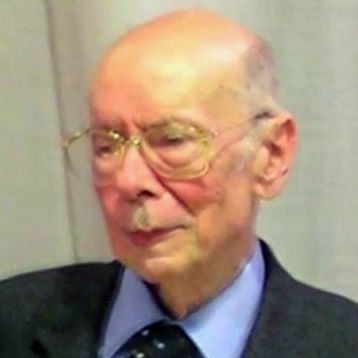- Surname:
- Benedetti
- First name:
- Gaetano
- Era:
- 20th century
- Field of expertise:
- Psychiatry
Psychoanalysis
Psychotherapy - Place of birth:
- Catania (ITA)
- * 07.07.1920
- † 02.12.2013

Benedetti, Gaetano
Italian psychiatrist, psychotherapist and psychoanalyst.
Gaetano Benedetti (1920-2013) was born in Catania, Sicily, as the oldest son of a well-renowned surgeon. He studied medicine at the University of Catania where he also started his training in psychiatry. He moved to Switzerland in 1947 to study psychopathology at the psychiatric clinic of Zurich University. In 1949, he married his Swiss wife, Anita; the couple had four children. Following a nine-month research stay in the United States, he returned to Zurich and gained the formal qualification for a professorship (habilitation) in Switzerland in 1953. His supervisor was Manfred Bleuler. The qualification for a professorship in Italy, awarded by the University of Rome, followed in 1955. He was appointed associate professor of psychohygiene and psychotherapy at the University of Basel in 1956. Benedetti had to decline an offer for a professorship at Frankfurt University in 1960 because he was temporarily suffering from a severe neurological disease. In the 1980s, he was a visiting professor at the University of Perugia’s medical school. He became emeritus in 1985 but continued his scientific studies and treated patients in his private practice. His wife’s death in 2004 left him deeply shaken. Gaetano Benedetti died in Zurich in 2013, at age 93.
Psychotherapy of psychosis
Benedetti made important contributions to the therapeutic understanding of schizophrenic disorders and the psychotherapeutic treatment of psychoses in general. He thus broke with the then-dominant paradigm that schizophrenia could not (or at least not significantly) be influenced by psychotherapeutic means. His method is characterised by the attempt to empathise as much as possible with the patient’s world of experience and to identify with the patient during the transference process. According to Benedetti, this form of “being with the patient” was the appropriate therapeutic response to the “negative existence” experienced by a disturbed person. Together with his Swiss colleague Christian Müller, he initiated the International Symposium for the Psychotherapy of Schizophrenia (ISPS) in 1955. In 1963, he founded the Milan-based Associazione e scuola di studi psychonanalitici, an institution where psychologists and physicians received training in psychoanalysis and psychotherapy.
Main works
In his 1975 book Psychiatric Aspects of Creativity, Benedetti advocated the integration of patient art and its symbolism into the psychotherapeutic process. He stated that these paintings, drawings and sculptures had to be acknowledged as expressions of creativity in the context of their creators’ symptoms. In this therapeutic setting, the therapist would interpret the symbolic meaning of an artwork together with the patient, a process that facilitates a “dialogical positivation” and releases a “transformatory power [...] which turns a negative situation into a positive situation (Benedetti 1999: 94; our translation).
In 1980, Benedetti published his best-known book on the theory and therapy of schizophrenia, Alienazione e personazione nella psicoterapia della malattia mentale. The book consists of three parts: the psychopathology of schizophrenia (I), its psychodynamics (II) and psychotherapy (III). This subdivision notwithstanding, Benedetti conceptualised the psychopathology and psychotherapy of schizophrenia as a unity.
Awards
1981: Jakob Burckhardt Prize, awarded by the Swiss Johann Wolfgang von Goethe Foundation
1983: Honorary member of the German Psychoanalytic Society
1985: Hans Prinzhorn Medal, awarded by the German-speaking Society for Art and Psychopathology of Expression
1999: Margrit Egnér Prize, awarded by the Swiss Dr. Margrit Egnér Foundation.
Literature
Benedetti, G. (1952): Die Alkoholhalluzinosen. Stuttgart: Thieme.
Benedetti, G. (1964): Klinische Psychotherapie. Bern, Stuttgart: Huber.
Benedetti, G. (1964a): Der psychisch Leidende und seine Welt. Stuttgart: Hippokrates.
Benedetti, G. (1973): Psyche und Biologie. Stuttgart: Hippokrates.
Benedetti, G. (1975): Psychiatrische Aspekte des Schöpferischen und schöpferische Aspekte der Psychiatrie. Göttingen: Vandenhoeck & Ruprecht.
Benedetti, G. (1975a): Ausgewählte Aufsätze zur Schizophrenielehre. Göttingen: Vandenhoeck & Ruprecht.
Benedetti, G. (1976): Der Geisteskranke als Mitmensch. Göttingen: Vandenhoeck & Ruprecht.
Benedetti, G. (1980): Alienazione e personazione nella psicoterapia della malattia mentale. Turin: Einaudi.
Benedetti, G. (1992): Psychotherapie als existentielle Herausforderung. Göttingen: Vandenhoeck & Ruprecht.
Benedetti, G. (1999): Das Symptom als kreative Leistung. In: P. Buchheim, M. Cierpka, T. Seifert (eds.): Lindauer Texte zur psychotherapeutischen Fort- und Weiterbildung. Symptom und Persönlichkeit im Kontext. Ressourcen. Aspekte der Wirklichkeit. Berlin: Springer, pp. 93-106.
Benedetti, G. (2006): Symbol, Traum, Psychose. Göttingen: Vandenhoeck & Ruprecht.
Erdmann, M. (2014): Nachruf auf Gaetano Benedetti. In: Forum der Psychoanalyse 30, (1), pp. 1-2.
Küchenhoff, J. (2013): Gaetano Benedetti, der Pionier psychoanalytischer Psychosenpsychotherapie, ist verstorben. In: Schweizer Archiv für Neurologie und Psychiatrie 164, (8), pp. 260-261.
Rachel, B. (ed.) (2000): Die Kunst des Hoffens. Begegnung mit Gaetano Benedetti. Göttingen: Vandenhoeck & Ruprecht.
Tölle, R. (1983): Gaetano Benedetti: Todeslandschaften der Seele. In: Deutsches Ärzteblatt 80, (44), pp. 124.
Julian Schwarz
Referencing format
Julian Schwarz (2015):
Benedetti, Gaetano.
In: Biographisches Archiv der Psychiatrie.
URL:
biapsy.de/index.php/en/9-biographien-a-z/193-benedetti-gaetano-e
(retrieved on:23.04.2024)
